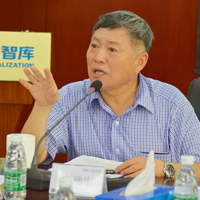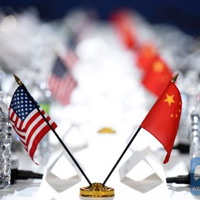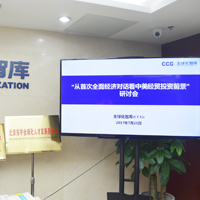- 当前位置:
- 首页>
- 活动>
- ���������������
���������������
CCG持续关注国际关系议题,推动中国与全球化的发展,积极开展国际交流,充分发挥智库“二轨外交”作用,在巴黎和平论坛、达沃斯世界经济论坛、慕尼黑安全会议等重要国际政策与意见交流平台上组织分论坛、边会、圆桌会议、晚宴等活动,促进国际政商学界对话,凝聚共识;CCG积极与各国政界、智库界、工商界开展“二轨外交”活动,每年常态化赴多国调研与交流,促进中外关系攸关方互动,保持与多国政策圈层的沟通渠道。
-

【环球时报】“菲佣入华”消息引国内媒体关注
【《环球时报》报道】菲佣要来中国,而且月薪高达人民币1.3万元?据《菲律宾星报》7月31日报道,菲律宾劳动就业部7月30日发布一份报告称,中国大陆打算聘请菲律宾家政服务人员前往北京、上海、厦门等5个大城市就业,并承诺给予这些菲佣很高的工资。中国驻菲律宾大使馆新闻发言人李凌霄7月31日对《环球时报》记者表示,不掌握此事情况。菲律宾驻华使馆同一天对《环球时报》表示,双方仍在商讨阶段。截至发稿,中国人力资源和社会保障部尚未对《环球时报》的相关采访做出回应。 菲律宾一直以来将菲佣作为一种产业向外输出。菲律宾家政服务人员是高级佣工,因文化程度较高,懂英语,有“世界上最专业的保姆”之称。中国香港、新加坡和美国是菲律宾女佣最喜爱的目的地。全球化智库(CCG)秘书长苗绿7月31日接受《环球时报》记者采访时表示,目前,菲佣在中国国内已经是一个既有现状,不论是否合法合规,一些人对菲佣已经有了需求。尤其对于中国家长而言,希望孩子从小能学好英语,母语为英语的菲佣在这方面有优势。 香港《商报》称,香港目前有35.2万名外籍家庭佣工,其中18.9万人为菲律宾外佣。目前香港外佣的最低工资为月薪4310港元(约合人民币3712元),较菲律宾当地工人平均月薪1700元高出1.5倍。新加坡的菲佣数量为7万人,最低工资为570新加坡元(约合2826元人民币)。4月初,日本首次“引进”菲佣,月薪为16.8万日元(约合人民币1.02万元),相当于菲律宾同类工作的大约10倍。《菲律宾星报》称,即将入华的菲佣月收入可达1.3万元。苗绿认为,目前,国内家政市场的服务质量和发展水平还无法满足快速增长的中产阶级需求,如果可以引入菲佣,一方面会带来“鲶鱼效应”,另一方面,会倒逼该行业培训、服务等方面的质量提升。 截至目前,中国大陆允许获得在华永久居留资格或持有工作类居留许可的外籍人才和港澳台高层次人才聘用外籍家政服务人员,而普通家庭雇用菲佣并不合法。一位曾对菲佣在华现状做过调研的专家表示,其实在北京、上海等发达城市的高端社区,经常能见到菲佣。 但中国真的需要那么多菲佣么?北京大学经济学教授曹和平7月31日接受《环球时报》记者采访时表示,菲律宾有输出家政服务人员的传统,在该领域的专业程度确实高于国内平均水平。适当引入菲佣,可以带活国内家政服务市场,也可以起到示范、引导作用。但中国对于菲佣的引进需要谨慎,因为这不是普通的“农民进城”而是“外国农民进城”。曹和平认为,目前,我国劳动力整体充足,还没达到需要从国外进口劳动力的阶段。 此外,曹和平认为,中国庞大的城市人口和新兴中产阶级有着广阔的市场,如果中国大量放开市场引入菲佣,大批菲律宾劳动人口从该国出走,会对菲律宾本国的经济与全球家政市场造成冲击。文章选自《环球时报》,2017年8月1日
2017年8月2日 -
李稻葵:重新认识中国古代经济大图像
李稻葵,全球化智库(CCG)学术委员会专家,清华大学中国与世界经济研究中心主任。 13年前我回国工作,当时的一个基本想法是以后的研究应以中国话题、中国视角为主,而非简单延续国外同行的研究课题和方法。过去十几年来,我一直关注的一个课题就是中国历代经济大图像,因为到目前为止我们仅是了解局部的经济现象,如江南的米价波动、江南运河修浚等等,顶多是瞎子摸象。只有全面了解自己的过去,一个民族才能更好地了解自己的今天。而了解过去的基础工作,是了解这个民族历史上经济发展的整体情况,并进行国际比较。中国古代经济史的两个新发现 过去十几年来,我觉得非常幸运的是能帮助清华经管学院培养、建立一支中国经济史研究队伍,他们专注研究中国古代经济大图像,其中包括如今在北大经济学院任教的管汉晖,在中央财大任教的伏霖、金星晔以及在证监会研究中心任职的石锦建。我们的团队系统测算和研究了北宋、明、清的GDP总量、经济结构、增长格局以及公共财政等问题。这对了解我们自身、了解历史上的中外对比起到关键作用。最近我们又和牛津大学史蒂芬·布劳德伯利教授合作,比较了历史上中外的经济发展水平。研究得出以下基本结论: 第一,从北宋初年(公元980年)到明代,中国人均GDP在较高水平上波动,清代则呈下降趋势。我们的分析表明,人均GDP下降的原因,主要是人口增长速度超过资本、土地的积累速度。在将近900年时间里,人均耕地面积持续下降,这一下降没能被粮食亩产量的上升所弥补。换言之,人均占有的土地量、劳动工具包括牲口数量是下降的,这导致劳动生产率不断降低。 第二,通过国际比较发现,北宋中国生活水平世界领先,但到1300年左右已落后于意大利,1400年前后被英国超过,1750年之前,虽然中国部分地区和欧洲最富裕地区生活水平相距不远,但作为整体的中国已落后于西欧,因而,东西方的大分流在工业革命前已经开始。这一发现与以上人均GDP逐渐下降的发现密切相关,也就是说中国人均劳动生产效率的不断下降对于经济发展、国家进步是重要的负面因素。较之国际同行更为科学严谨 这些发现在中国经济学界引起一些关注,但重要性应该还未被完全意识到。最近英国《经济学人》以及日本《日本经济新闻》杂志对此进行报道,之后才反馈到国内,同时不可避免地引发一些议论。在此,有必要进行一些说明。 这个项目是一个长期、系统、艰苦的研究工作。我们用生产法测量中国古代GDP总量、人均量及结构,测量的基础是相关朝代官方和民间的各类记录。比如对于明朝,我们使用《明实录》、《万历会计录》、地方志等史料进行测算,这些史料对人口、粮食以及手工业(包括陶瓷、纸张、生铁、铜等生产量)都有比较详细的记录。宋代的数据则来自《宋会要辑稿》《宋史·食货志》《续资治通鉴长编》《文献通考》等。事实上,中国在这些方面历史数据的记录远超同时期其他国家。正是得益于中国历史数据的完备性,和国际同行相比,我们的研究在方法论或数据完备性上远远领先。 据此,我们不同意中国经济史“加州学派”的观点,他们认为中国清代经济发展水平是世界领先的。我们的数据比“加州学派”更全面。同样,我们也推翻了英国经济学家麦迪逊有关中国经济史研究的若干结论,他认为中国人均GDP在宋代从450美元上升到600美元,此后一直维持在这一水平。这一推测与我们的研究结论完全不同。麦迪逊已于2010年去世,在那之前,我们与他有过多次通讯来往,仔细请教其计算中国经济总量的基础性假设。他通过电邮告诉我们,他完全是通过自己的估算假设中国历朝历代的人均GDP水平,然后乘以人口数量得出经济总量。相比而言,我们使用具体数据进行严谨计算和检验,虽然还有很多地方需要继续改进和完善,但应该说比麦迪逊的估算前进了一大步。研究历史是为了解现在展望未来 接下来的问题是,如何解释我们的研究发现?有人说,我们的发现证明中国历史上并没那么强大,或者说中国历史上并没那么辉煌。这些解释都不准确。我们的发现是说中国人均GDP在公元1000年左右处于世界最高水平,只是从公元1300年左右开始落后于意大利,1400年开始落后于英国,这并不等同于说中国在历史上没有那么辉煌。相反,这说明中国古代的经济发展比我们之前的认知更加早熟,古代社会达到人均发展水平高点比我们之前的认知更早,中国经济开始落后于西方的时间段也早于世人之前的认知。 那么,如何解释中国古代社会经济发展比之前认知的更加早熟、落后于西方的时间段更早?学术界对此有许多不同观点,这显然超出了我们基于统计数据研究的范畴。而我个人倾向于做如下解释:一、中国是世界上少有的很早就在意识形态上达成统一的国家,历史上西汉时期就已达成这种统一。二、与此相适应,中国古代大一统的政治体制也相对成熟得非常早。三、中国处于欧亚大陆的最东端,没有受到太多外来者的侵占和攻击。因此,中国很早就出现了一个意识形态相对统一、政治经济体制相对稳定的大格局。 这种意识形态和政治体制的早熟使中国的经济很快达到其增长的潜在水平,进入稳态之中。同时,由于处于主流意识形态的孔孟之道崇尚多子多福,中医又有较为发达和成熟的保健和保障生育技术,所以人口增长很快。这样一来,中国很快形成一个大而不强、稳定但又相对脆弱的帝国形态。这并不是说中华文明落后于世界,而是说明中华文明是世界文明中比较早熟、比较独特的一支。 据此,可以得出一个推论,那就是中国如果没和外界发生直接的交流和冲突,就不可能发生英国式的工业革命。因为中国的人均GDP下降,导致劳动力持续过剩,对节约劳动力的技术创新需求不足。尽管在中国个别地区如江南地区人均GDP相对较高,但难以想象在大一统的体制下,局部地区出现资本主义体制,而整个国家仍然是封建体制的状态。 目光转向今天,中国为什么能迅速发展?因为中国长期以来坚持的传统文化有着强大生命力,这种自洽、稳定的文明体系在西方列强的冲击下迸发出自我革新和自我变更的强劲动力,发奋自强、以夷为师,不断探索,最终带来中国改革开放四十年的巨大成绩。 研究历史不仅是为了揭示我们的过去,更重要的是为了展望未来。研究过去让我们懂得我们自身发展历程,也让我们倍加珍惜当今盛世,从而转化为激励我们不断改革、开放、创新的动力。文章选自环球网,2017年7月31日
2017年8月1日 -

著名国际关系学者赵穗生CCG演讲:中美之间并非零和游戏
二战后尤其是冷战结束后,美国一直是国际秩序的积极主导者。但特朗普当选美国总统之后,美国似乎正在逐步退出由他一手打造的世界秩序体系。作为新晋崛起的大国,中国却以积极的表态和实际的行动树立了中国现行国际秩序积极维护者的形象。在这一轮的世界秩序重塑过程中,中美两个大国将如何定位各自的角色和作用?两国又将如何在分歧与合作中博弈?中国是否能够成为现有秩序的改革者? 2017年7月31日,全球化智库(CCG)邀请CCG学术委员会专家、资深中国问题专家、美国丹佛大学约瑟夫·克贝尔国际关系学院终身职正教授、美中合作中心主任赵穗生在CCG发表演讲。赵教授以他驾驭中外的文化背景和深厚学养,围绕“世界秩序的重塑:中美在全球治理中的博弈”的主题,为与会者厘清未来全球秩序下的中国定位以及中美关系的未来走向。CCG主任王辉耀博士致辞,CCG副主任、秘书长苗绿博士主持会议。 王辉耀博士首先介绍了赵穗生教授在国际关系和中美研究等方面的精深造诣。他表示,二战后诞生了联合国、国际货币基金组织、世界银行等国际机制,这些第一波全球治理机制主导了世界过去六七十年的发展。但近来“英国脱欧”以及美国总统特朗普上台后推行一系列反全球化政策,给世界带来诸多不确定性,而中国作为崛起的大国,坚定地支持全球化和自由贸易,并维护巴黎气候协定成果。CCG非常关注全球化,中美在全球治理和世界秩序中的角色和互动非常值得分析。他回顾到,现在国际竞争性招标 (International Competitive Bidding)在中国的普及要归功于世界银行80年代在中国推广相关概念。中国市场机制的建立和国际治理达到今天的高度也是中国积极参与第一轮全球治理的成果。王辉耀博士指出,在新一轮全球化中,中国领导人已不只讲中国模式、中国道路,而是站在全球角度来看全球问题,“一带一路”实际上也是中国尝试为全球治理提供的公共产品。如果未来中国、欧洲和美国能进一步推动全球化,并建立起亚太自贸区,将会是非常好的现象。 CCG学术委员会专家赵穗生在演讲中表示,谈到世界秩序,首先要定义它是什么。世界秩序就是在全球治理当中的游戏规则(laws,rules and institutions),它是通行的大家认为的价值、概念和机制。国家可以就此分为三类:大国(rule maker)塑造着全球秩序;小国(rule taker)追随、执行大国制定的秩序;崛起的大国(rule breaker )因不满意既成大国所塑造的秩序(status quo),而常常打破这些规则,重新塑造反映它的价值观念和利益的游戏规则或者世界秩序。 赵教授指出,目前的世界秩序是由美国领导的在二战后建立起来的,这个秩序面临着两方面挑战。第一个挑战是很多人认为,中国作为一个崛起的大国,进入21世纪后对现存的国际秩序越来越不满意,中国也不例外地现在要挑战甚至替代美国,重塑符合自己利益和价值观的世界秩序。第二个挑战来自于美国本身,虽然现存秩序是美国自己领导和塑造的,但特朗普上台后做的很多事情都在瓦解或挑战这个秩序,这种挑战和中国的崛起加在一起,很多人就认为,中国完全有可能替代美国,重建二战以后的世界秩序。 关于这个问题,赵教授认为,“中国并没有替代,也不可能在短期内替代美国而重新塑造二战以后的世界秩序。”他指出,回答这个问题要看二战后的秩序是什么样的秩序。它是以混合原则所主导的国际秩序,一方面有很强的自由主义,另一方面其根本的指导原则还是1648年《威斯特伐利亚合约》建立起的以民族国家主权为基础的原则。联合国宪章所规定的国际机构就是明显的例子,国家主权在安全事务、经济、贸易、投资和金融领域受到了不同程度的修正,让步给一些国际机构。而尽管中国在建国之初被排除在联合国之外,但中国并没有一个和现存体系相背离的价值观念,万隆会议上提出的和平共处五项原则也完全是当时国际秩序最主要的价值观念。挑战现存体系的价值观念实际是现存国际体系当中最根本的价值观念--主权原则。所以,在这个过程中,中国最后就在加入联合国以后很快融入现存的国际秩序,最后变成现存国际秩序的利益相关者、参与者和贡献者。 但中国并不是对现存国际秩序就百分之百地满足。赵穗生教授指出,不满意主要表现在三方面:一是现存国际秩序指导原则的制定,因为中国当时不在场,现有的国际秩序反映的是自由主义、人权或对主权侵蚀的西方主流价值观念,而中国由于国家政治制度和历史文化原因对很多概念不能接受,感到被排斥。二是中国的代表权、发言权,中国的国民生产总值占全球比例由二战后的1-2%增加到15%左右,但经济力量的变化并没有反映在现存国际秩序机制当中,而这种要求很大程度上受到美国的压制。三是美国双重标准,美国主导世界游戏规则很大程度上是对人不对己,他不愿意把自己放在中国和其他成员国的地位上,但要求其他成员国遵守他自己制定的规则。 在国际社会来看,过去中国只讲参与,从来没有谈引导,现在中国要引导国际社会建立国际秩序和国际安全,中国在国际治理中的角色就发生了转换,中国很大程度上在全球治理中要发挥领导作用了。但中国现在是否有这样的能力来替代美国成为塑造国际秩序的主导者,或者成为全球化的引领者?赵教授认为,“中国目前做的事情并不是要取代美国。” 原因一是在“硬实力”方面,国际秩序的塑造者要花很多资源,中国目前还没有足够的资源来取代美国。事实上美国已经深深地嵌入全球生产链中,特朗普的很多政策仍然脱离不了传统上美国在国际事务当中的责任。二是在“软实力”方面,美国在世界上的领导地位不仅是由于其硬实力,很大程度也是它的软实力,全世界很多国家铁了心跟着美国,信任美国,中国也开始有这样一些国家,但数量和美国相比还比较少,中国价值观的认同度和美国普世价值的认同度相比还有很大差距。三是中国还是现存美国主导的国际秩序的最大受益者。试想一下,如果中国把美国驱逐出亚洲,亚洲就会是无政府状态。也有学者提出,亚洲本身就会受到挑战,因为亚洲这些国家的历史恩怨以及边界冲突,很大程度上能被压抑住是因为美国这些年在这个地区所建立的一套安全体系所起的作用,美国在这些地区的影响力中国在相当长时期不可能替代。 他总结到,中美之间的发展不是一种零和游戏,完全是一种双赢,中美之间的相互依存程度已经达到前所未有的地步。多年来,中国被很多国家说是一个搭便车者(free rider),现在正在发挥越来越重要的作用。中国很大程度上是要求改革现存秩序,而不是要重新塑造国际秩序,是要改变美国在国际事务中的霸权,改变中国在国际游戏规则制定中的地位。从中国角度来讲,也应该明确向美国或全世界宣布,中国是现存国际秩序的维护者,因为中国仍然是受益者,但中国不满的、要改革的是国际秩序当中,以中国为代表的发展中国家或新兴国家的发言权和代表权。这一点是中美之间全球博弈的焦点。 在互动环节,赵穗生教授就中美首次全面经济对话结果,美国如何看待中国引领全球化,中国是否面临“战略透支”,以及中美两国如何相互妥协与合作等问题展开进一步交流。 与会嘉宾还有CCG“一带一路”研究所执行所长黄日涵,CCG常务理事、点融网首席政策顾问郝作成,CCG理事、安学国际有限公司创始人、总裁徐耀良,CCG执行秘书长李卫锋博士,CCG副秘书长唐蓓洁博士,CCG有关研究员等以及国内数十家主流媒体。
2017年8月1日 -

【China Daily】Looking for a house away from home
Zhang Le (second from right) enjoys a meal with her family and friends at her rented house in the United States. She is a music education doctoral student at Pennsylvania State University. Provided to China DailyAs more young people head abroad to study, the demand for student accommodation is growing rapidly."I was not feeling good in the house. My roommate and landlord were not easy to get along with so I moved one month after I arrived in Britain," says Liu Tianyi, a 26-year-old master’s student from Durham University.In 2015, Liu, a native of Zhuzhou in Hunan province, went to the United Kingdom to study international social work and community development. Before leaving China, she found a house through her friend on Sina Weibo, a Chinese micro blog.Liu knew nothing about the house until she arrived in the UK."The house was on a hill and very far away from downtown Durham. And my landlord was not friendly," says Liu."I also had lots of fights with my roommate since he always reported me to the landlord for not sorting the garbage, which I did."For Liu, life abroad was different from what she had imagined - she was not prepared for the problems.Today, there are many students like Liu who struggle to find suitable accommodation abroad.Growing demandChina had 1.26 million students studying abroad by the end of 2015, about 25 percent of the world’s total, according to a report by the Beijing-based think tanks Center for China and Globalization(CCG) and Chinese Academy of Social Sciences.The overseas student accommodation market has great potential."If we look at the rents in cities across the globe, then we’re looking at an industry valued at around $150 billion," says Luke Nolan, CEO of student.com, a platform head-quartered in the UK that provides overseas student accommodation service."We’ve also noticed that, in addition to the market for full academic year accommodation, there’s a growing demand for short-term accommodation."Liu returned to China after a one-year program.Speaking about her experience, she says that she should have put in more effort in finding a house."Taking the initiative is crucial," says Liu.New media platforms offer a way for students to look for accommodation.Zhang Le, a 31-year-old music education doctoral student at Pennsylvania State University in the United States, found a house by going online."I found a house through Penn State’s BBS," says Zhang, a native of Shuangyashan in Heilongjiang province. "After I got the contact of the landlord, I told him to download WeChat (Chinese messaging app), through which we could communicate."This helped Zhang to understand the neighborhood and the ways of commute. Now she lives in a two-bedroom house with her husband.Overseas study is no longer only for the young, as many older students now take along dependants, just like Zhang."I had to plan in advance as my husband was to stay with me. I was fortunate to find a good house, but it could be difficult for those who are young," says Zhang.Even as demand for overseas accommodation by students from China grows, there is still no convenient way to find housing, since this is an industry with both complexity and variety."Almost every city in China has students going to a huge range of destinations, including the UK, the US, Australia, Canada, France and Germany," says Nolan."Students from different countries have different needs, and the property markets are different, too."Li Jiabao, a 23-year-old law student from Sciences Po in Paris, says that international students from non-European Union countries need a guarantor to rent a house in France."In my four years at university, I was lucky that I had a roommate from Norway in the first year and then a Chinese agency that helped with the guarantor bit, but it was slightly expensive."Still, not every student studying in France is lucky enough like Li, a native of Shenyang in Liaoning province.Safety is keyBesides the hardships in finding housing in different countries, safety is one of the main considerations for Chinese students, followed by location and price, according to an overseas student accommodation report by student.com.As for Zhang, she says: "I suggest that a freshman should live on campus for the first year."As for single female students, it would be better to find a roommate instead of living alone."In addition, colleges sometimes send out information.Giving her take, Li says: "Location really matters."Science Po is located a little far from where she lives."Some of my classmates lived in nearby cities, which were roughly a one-hour commute," Li says.Liu emphasizes that finding good accommodation eases the culture shock."When I was in the United Kingdom, my roommates always hosted parties on the weekend. I am not the kind of person who socializes very much, so attending the parties helped me to immerse myself in the community," she says.For a lot of Chinese students, studying abroad is the first time they are away from China or the first time they are living by themselves.So, when faced with new languages and cultures, it can be quite challenging to adapt.Nolan says that the notion of "student community" is vital.From China Daily,2017-7-28
2017年7月31日 -

【China Daily】Good outlook for bilateral trade
Analysts from a leading Chinese think tank said they were optimistic about the prospects for China-US trade and investment, calling for a restart to negotiations on a bilateral investment treaty and for the promotion of cooperation in fields such as services trade and energy."We are optimistic about the prospects as Chinese entrepreneurs are optimistic about economic growth in the United States, which creates a huge potential for investment in the US," said Lu Jinyong, director of the China Center for Investment Promotion.Lu spoke at a symposium on the China-US Comprehensive Economic Dialogue, hosted by the Center for China and Globalization (CCG)on Tuesday. The center is one of China’s top privately funded think tanks.According to the Foreign Ministry, the dialogue focused on macroeconomic policies, trade and investment, and global governance, while seeking to expand cooperation and tackle differences.CCG Director Wang Huiyao said China wanted fair treatment for Chinese companies investing in the US and more relaxed export controls, while the US wanted balanced trade.The US is seeking wider opening-up by China to cut the trade deficit, due to growing interdependence between the two countries, Lu said. Data showed investment Chinese businesses have made in the US had surpassed those from the world’s largest economy.Bilateral investment hit a new record high of $60 billion last year with $45.6 billion coming from China, according to a report jointly released by the CCG and the US-based Rhodium Group last month. China had a trade surplus of around $250 billion with the US last year.Lyu Xiang, a researcher on US studies at the Chinese Academy of Social Sciences, said China’s trade surplus partly stems from different positions in the current global supply chain."Taking the iPhone as example, more than half of its components are purchased around the globe and then assembled in China, but Apple Inc takes half of the net profits," Lyu said. "So the US has to look at the deficit from an objective angle."Cui Fan, a professor of international trade at the University of International Business and Economics in Beijing, said China and the US have increasingly shared interests.China and the US should restart negotiations on a bilateral investment treaty, he said. BIT negotiations were initiated in 2008 and both countries agreed to exchange the second round of negative lists last June.He Weiwen, a senior researcher at the CCG, said the treaty is in line with the economic interests of the US as the business community in the US has strongly called for such an agreement.CCG’s Wang Huiyao said both countries can also cooperate in infrastructure and energy. US President Donald Trump has an ambitious plan to rebuild the infrastructure system as an important way to boost manufacturing and employment.Chinese companies have been known for their cost-efficiency and efficiency in building highways, railways and ports. For example, CRRC Corporation Limited has bid for subway projects in Boston and Chicago, Wang said."Infrastructural cooperation can help achieve more balanced economic ties between the two countries," Wang added.From China Daily,2017-7-28
2017年7月31日 -

【Bloomberg View】China Focuses on Avoiding Trade War as Xi-Trump Honeymoon Ends
With the honeymoon period ending between Donald Trump and Xi Jinping, China is focused on making the relationship work to avoid a trade war between the world’s two biggest economies.High-level economic talks in Washington on Wednesday began with tense exchanges and ended with no joint statements and no major breakthroughs. While Trump’s team claimed victory, China took a more conciliatory tone: The foreign ministry said Thursday that both sides agreed to start “constructive cooperation” to narrow a $309 billion trade deficit.The post-meeting statements, while hardly positive, pave the way for more dialogue following a volatile period since Trump’s election win in which ties lurched between extremes. Initial fears of a full-blown trade war disappeared after Trump praised Xi during an April summit, only to resurface recently after the U.S. president faulted him for failing to do more on North Korea."Like marriage, you wouldn’t go directly for divorce just because you have some bickering," said Ruan Zongze, vice president of the China Institute of International Studies in Beijing and a former top diplomat in Washington. "China-U.S. ties have grown to be deep and strong enough to absorb setbacks, as long as these setbacks don’t turn into drastic ups and downs."China’s two-way commerce with the U.S. last year amounted to about $600 billion, nearly twice as much as its second-biggest trading partner Japan. The U.S.’s trade deficit with China is more than three times greater than with Mexico, another frequent target of Trump’s ire.‘Big Step’Treasury Secretary Steven Mnuchin said before the meeting that the U.S. would push China to lift foreign ownership restrictions in its financial services industry and to remove hurdles for the technology sector. The brief U.S. statement after the meeting made clear that didn’t happen, with Mnuchin and Commerce Secretary Wilbur Ross saying China “acknowledged our shared objective to reduce the trade deficit.”Still, Mnuchin cast the meeting as a success, telling the Financial Times that the administration achieved a “very big step forward” in tackling the deficit. He told the newspaper that Beijing had “heard the direction of the marching orders” Trump had given them.In Beijing, the foreign ministry said that both sides agreed to narrow the gap and the main result was establishing a "correct direction" for bilateral economic cooperation -- a standard phrase indicating the need to resolve disputes only through dialogue.China’s vague comment acknowledged that the meeting didn’t yield anything concrete, according to He Weiwen, deputy director of the Center for China and Globalization(CCG) in Beijing."Nobody here really expected the first talks to produce much," said He, a former business attache at China’s consulates in New York and San Francisco. "What we’ve got is not some contingent plan. China plays a long game with the U.S., and won’t be discouraged by a small setback like this one."Early on, Trump linked trade policy with China’s action to stem North Korea. After a few months went by with little action, the administration has indicated it’s weighing tariffs or restrictions on imports of Chinese steel and aluminum, which it says unfairly flood global markets and make U.S. producers unable to compete.While that stance means China remains vulnerable to U.S. protectionism, the approach "seems to reduce the risk of more significant harm to China’s exports to the U.S.," said Louis Kuijs, head of Asia economics at Oxford Economics in Hong Kong. The former World Bank and International Monetary Fund economist said China sends little steel to the U.S. and both sides ultimately "don’t really want to see an escalation."Tug-of-WarChinese Vice Premier Wang Yang warned on Wednesday that the two countries were so mutually dependent economically that "confrontation will immediately damage the interests of both." He cited Xi’s remarks at Mar-a-Lago: "There are a thousand reasons to make the China-U.S. relationship work, and no reason to break it."That contrasted with comments by Ross, who scolded China about trade imbalances and said they need to improve."There’s a tug-of-war between the economic nationalists and the more corporate-friendly Trump camps, and it had seemed the former were winning -- Ross’s words suggest so," said Michael Every, head of financial markets research at Rabobank Group in Hong Kong. "However, China is simply not going to budge. It probably figures the U.S. will just back off."The U.S. had higher hopes immediately after the Trump-Xi meeting, and saw some initial results. The 100-day action plan, which expired Sunday, reopened China’s market to U.S. beef after 14 years.Despite tensions, Trump has maintained praise for Xi of late. While visiting Paris last week, he called his Chinese counterpart a "terrific guy" and "great leader." Those personal bonds may at least help avoid some of the worst-case scenarios."There will be bumps on the road as both China and U.S. test each other’s position," said Chua Hak Bin, a senior economist with Maybank Kim Eng Research in Singapore. "Trade negotiations will be more of a dance than a fight. We don’t think the trade talks will degenerate into a broader trade war, as both sides stand to lose big."From Bloomberg View,2017-7-20
2017年7月31日 -

【经济日报】美国应摆脱“扭转对华逆差”短视思维
日前,由全球化智库(CCG)举办的“从首次全面经济对话看中美经贸投资前景”研讨会在北京举行。与会专家认为,美国应摆脱“扭转对华贸易逆差”的短视思维,中美在基建、能源、高新技术产业、旅游产业等领域合作前景广阔。 贸易逆差一直是困扰中美关系多年的现实问题。对此,中国社科院美国问题专家吕祥认为,自1975年以来,美国一直处于逆差状态,而且日趋扩大,这个问题的根源在于美元本身。自1973年美元脱离金本位之后,美元成为一种不受任何约束的全球货币。从经济学角度来看,一旦一个国家的货币成为国际主导型储备货币,贸易上一定会出现逆差。美国需要在关键政策上作出到底是采取强美元还是弱美元的决定。如果美元强势,美国还能主导世界,全世界对美元还有需求。如果美国通过一系列操控把美元变成弱美元,美国的出口将有所增加,逆差随之减少,但美元的国际地位就会丧失,对世界的掌控能力也随之丧失,这对美国来说是两难选择。 吕祥认为,美国现政府的优先政策是释放美国能源产出能力,这中间蕴含着巨大的中美合作潜力。美国地下所藏页岩油、页岩气价值50万亿美元,可以开采100年至200年,这将成为美国经济下一个增长点。但是,大幅度开发页岩油气,美国现在没有成本优势,所以仍然处于亏损开发状态。中国可以参与美国的能源开发,参与有关能源的基础设施建设,比如合作投资大型液化气运输船等。 原中国驻旧金山、纽约领馆商务参赞何伟文认为,2015年至2016年,美国对全球商品出口累计增长了61.0%,其中对中国的出口累计增长了180.6%,同期从中国的进口增加了90.0%,对华出口增幅是进口增幅的两倍。中美贸易逆差是一个全球产业链的问题,应该从全球、行业角度来看待,不应该从双边角度苛责。根据WTO的一项统计,今年1月份至5月份,美国对G20其他成员国采取的贸易限制同比增长26%,其他19个国家对美国采取的贸易限制同比减少了29%。美国揪着“贸易逆差”不放是短视的做法,中美更应该着眼于“产业合作”,而不是互相掣肘。 对于中美未来合作的产业方向,全球化智库(CCG)主任王辉耀认为,重点合作领域首先是基础设施建设。在特朗普的重振美国计划中,基础设施建设是重点,中车、中建、万科、绿地等中国企业都已布局美国。中车在美国波士顿地铁、芝加哥地铁、洛杉矶地铁建设中已经拿到一些项目,中美基础设施领域合作可以有更大的发展空间,希望在该领域美国能够更加开放。其次,能源、天然气领域是新的合作增长点。中美在能源合作领域具备很强的互补性。第三是高科技领域,希望美方放宽对中国高技术出口的限制。与此同时,美国高科技公司也希望能更多参与中国市场。此外,在电影、旅游、留学等领域,双方也有很大的合作空间。文章选自《经济日报》,2017年7月28日
2017年7月31日